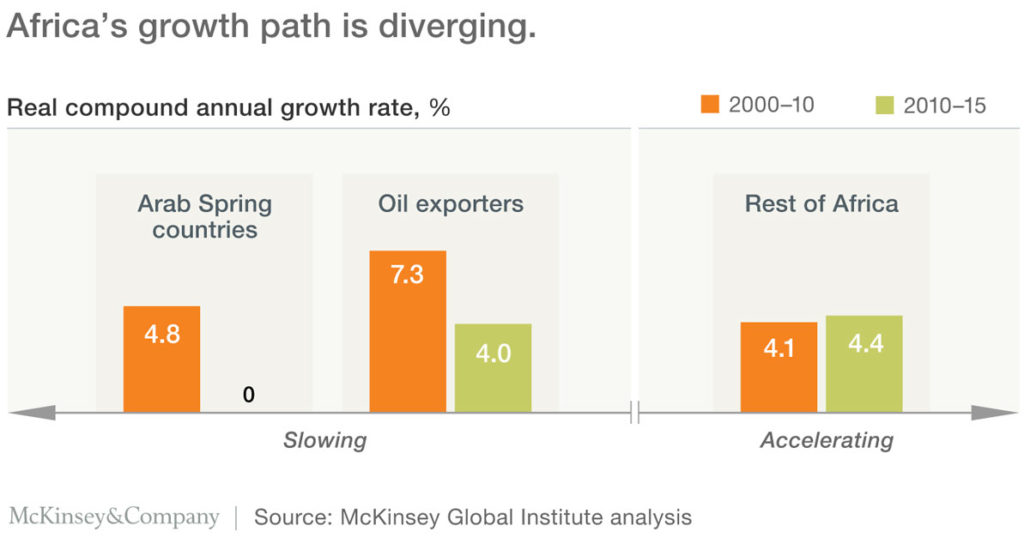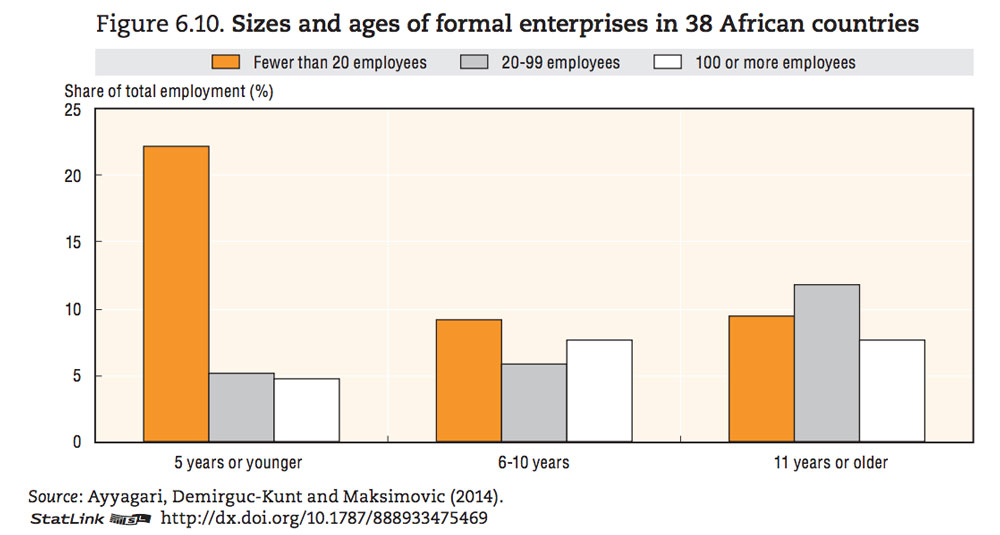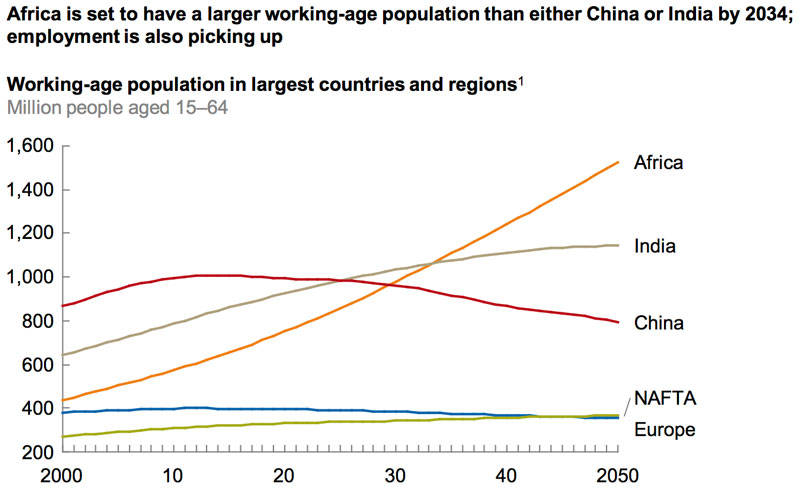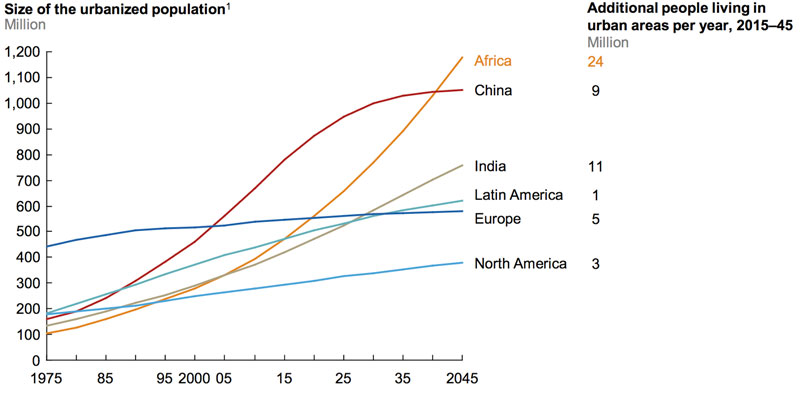A SOCAP Guest Post by Harrison Pharamond
“Africa rising” — an idea that shifted the narrative from the “hopeless continent” to a continent of strong economic growth and possibility. First popularized by The Economist in 2011 and reinforced by TIME Magazine in 2012, the phrase “Africa rising” reflected the continent’s impressive average annual GDP growth of 5.4% between 2000 – 2010. Six of the ten fastest growing economies during that time period were in Africa, and the future looked promising. But growth slowed to 3.3% annually between 2010 – 2015, and the shimmer of the “Africa rising” narrative began to fade. Economic growth in Sub-Saharan Africa slowed even further to 1.3% in 2016, registering the region’s worst growth rate in over two decades.
It is important to recognize, however, that Africa consists of 54 countries with vastly different economies and a wide range of economic and social challenges and opportunities, so treating the continent as a single economic entity risks over-simplification and inaccurate conclusions. A closer examination in the September 2016 report by the McKinsey Global Institute, Lions on the move II: Realizing the potential of Africa’s economies, reveals a complex story of economic development. Between 2010 – 2015, Africa’s average economic growth was dragged down by two groups of African economies: 1) Oil exporting countries hit by the decline in global oil prices (Algeria, Angola, Chad, Democratic Republic of Congo, Equatorial Guinea, Gabon, Nigeria, and Sudan), and 2) Countries affected by the political turmoil of the Arab Spring (Egypt, Libya, and Tunisia). The rest of Africa actually accelerated in growth from 4.1% between 2000 – 2010 to 4.4% between 2010 – 2015.
 Evidently, the story of Africa’s economic development is diverging. But fundamental aspects of the continent as a whole are promising, and the International Monetary Fund projects that Africa will be the world’s second-fastest growing regional economy between 2016 and 2020. According to McKinsey’s report, this growth will be sustained by a number of important factors, including:
Evidently, the story of Africa’s economic development is diverging. But fundamental aspects of the continent as a whole are promising, and the International Monetary Fund projects that Africa will be the world’s second-fastest growing regional economy between 2016 and 2020. According to McKinsey’s report, this growth will be sustained by a number of important factors, including:
1. Africa’s young and growing population
Every year between 2015 and 2030, an estimated 12 million young Africans are expected to join the African labor force. The U.N.’s most recent population projections anticipate that more than half of global population growth between now and 2030 will occur in Africa; of the 2.2 billion people who may be added to the global population, 1.3 billion will be African, more than doubling the size of the current African population by 2030. By 2034, Africa will have a larger workforce than either India or China. The challenge will be to match this immense population growth with formal job creation to maximize productivity.
2. Rapid Urbanization and Industrialization
Africa is urbanizing faster than any other region of the world, and this trend is expected to continue at least for the next several decades. By 2026, an additional 187 million Africans are expected to live in cities. Between 2015 and 2045, an average of 24 million additional Africans will live in cities each year, compared to 11 million in India and 9 million in China. Urbanization is strongly correlated with GDP growth, because productivity is statistically much higher in cities than in rural areas. In the words of the aforementioned McKinsey report, “higher productivity translates into higher incomes, and cities offer better access to infrastructure, education, and new markets, resulting in more rapid growth in consumption by households and businesses.” Industrialization is a primary catalyst and driver of urbanization, and is thus a high priority among African governments.
3. Accelerating Technological Change
Internet penetration and mobile technology are huge potential drivers of growth and productivity, and are actively transforming sectors like banking, healthcare, and education throughout Africa. Smartphone penetration, measured at 18% of the population in 2015, is expected to reach 50% by 2020. These technological advancements accelerate the pace of economic development by reducing the need for (and cost of) physical infrastructure while enhancing the efficiency and reach of products, services, and business transactions.
At the intersection of these three important factors lies something that is absolutely essential to the successful economic and social development of the African continent in the coming decades: entrepreneurship.
Entrepreneurship in Africa is booming. According to the African Economic Outlook 2017, a report jointly produced by the African Development Bank Group (AfDB), the Organization for Economic Cooperation and Development (OECD), and the United Nations Development Programme (UNDP), 22% of the working-age population in Africa are starting or running new businesses — the highest rate in the world, compared to 18% in Latin America and 13% in Asia. Around 80% of Africans view entrepreneurship as a good career opportunity, the report claims, and 44% of African entrepreneurs start businesses to exploit opportunities in the market, while 33% do so because they cannot find other jobs. African entrepreneurs are younger than in other developing regions with a median age of 31 years old, compared to 35 in Latin America and 36 in East Asia. African women are also twice as likely to start a business as women elsewhere.
Entrepreneurs acts as agents of both innovation and industrialization, and are thus integral to the sustainable growth of African economies. Approximately 20% of new African entrepreneurs start their business with the introduction of a new product or service, demonstrating that innovation is another driving motivation behind African entrepreneurship. Entrepreneurs play an essential role in introducing new technologies, products, and services to local markets. Through the exchange of new ideas and methods, entrepreneurs often connect rural producers with expanded markets, increasing rural competitiveness and enhancing productivity. Studies conducted for the African Economic Outlook 2017, which focuses predominantly on the role of entrepreneurship in the continent’s industrialization, found that private enterprises with fewer than 20 employees and less than 5 years of operations provide the largest share — 22% — of net job creation in Africa’s formal job sector. Overall, firms no older than 5 years account for one-third of net job creation, compared to 23% for 6-10 year-old firms and 29% for firms older than 10 years.
 According to the AfDB, however, the informal sector accounts for up to 80% of the African labor force and over half of Africa’s economic activity. Small enterprises tend to remain in the informal sector to avoid disproportionate taxes and burdensome government regulations that affect formal enterprises, but this often prevents them from utilizing government services and bank financing that would otherwise improve productivity. Thus, the potential of African entrepreneurs is immense, but remains largely untapped.
According to the AfDB, however, the informal sector accounts for up to 80% of the African labor force and over half of Africa’s economic activity. Small enterprises tend to remain in the informal sector to avoid disproportionate taxes and burdensome government regulations that affect formal enterprises, but this often prevents them from utilizing government services and bank financing that would otherwise improve productivity. Thus, the potential of African entrepreneurs is immense, but remains largely untapped.
There are many challenges to unlocking Africa’s entrepreneurial potential — including political instability, macroeconomic shocks, inconsistent government regulations, unfavorable business environments, weak infrastructure, fluctuations in global commodity prices, and more — but none as frequently cited as inadequate access to capital.
According to the IFC, African micro-, small-, and medium-sized enterprises (MSMEs) face a credit gap of approximately $136 billion. The African Economic Outlook 2017 cites five primary reasons for this:
- Lack of early-stage financing — bank lending and venture capital are scarce at the earliest stages of entrepreneurship in Africa, forcing most entrepreneurs to rely on personal savings and informal loans from their immediate personal networks for start-up capital.
- Cultural norms and gender-based legal restrictions — in several African countries, legal restrictions prevent women from owning property, making it more difficult to obtain loans. Gender discrimination in the marketplace and harassment are also common barriers.
- Differing perspectives from investors and entrepreneurs — entrepreneurs say that supply of capital is limited, while investors say that entrepreneurial ventures are not investment-ready.
- Lack of mid-range financing — the infamous “missing middle”, occupied by enterprises that are too big for small-scale lending through government programs or microfinance institutions and too small for large-scale lending from formal banking entities.
- Lack of long-term loans and equity financing — Nearly 60% of loans to African MSMEs have tenors of less than one year, and less than 2% of loans are for more than ten years.
International investors and socially-oriented organizations have a crucial role to play in filling this unmet credit need, but investment in African MSMEs is often expensive, difficult, and riskier than investment in other regions of the world. This year at SOCAP17, five panelists convened to discuss the “The Challenges of Early-Stage Entrepreneurship in Africa,” and how different types of international actors can work together with entrepreneurs to overcome these challenges and maximize Africa’s entrepreneurial potential. This discussion concluded with several concrete steps toward this goal:
- Shake off the notion of Africa as a “problem continent” — Investors have certainly moved passed the idea of Africa as a “hopeless continent,” but investment in the region is still held back by the notion of Africa as a “problem continent.” This often amplifies investors’ fears of financial loss, distracting from the potential scalability of an entrepreneurial venture.
“From my perspective as an entrepreneur, many investors still have strong reservations and are too risk-averse,” says Kwami Williams, Co-Founder and CEO of MoringaConnect, a social enterprise in Ghana. “If Africa is a continent of problems, then it is also a continent of opportunities. For both the entrepreneur and the investor.”
- Increase deal transparency — “It is important to demonstrate what it means to invest in Africa,” says Sally Walkerman, Senior Executive at the Small Foundation. “Many investors are not used to investing in MSMEs, especially in Africa.” Investment deals are being closed all the time, but the terms, valuations, structures, and other key factors are being kept in the dark. Increased deal transparency, especially with successful investment deals, will illustrate how deals can be executed successfully in the region and will encourage further investment.
- Build stronger relationships between investors and entrepreneurs — “Every investment involves trust on both sides,” says David Munnich, Chief Operating Officer IPDEV2 at Investisseurs et Partenaires (I&P). Aligning an investor’s expectations with an entrepreneur’s goals is a key factor in the success of many investment deals in the region. The relationship between investors and entrepreneurs is meant to be mutually beneficial. This is amplified when investors help the entrepreneur through the due diligence process with necessary business education and technical assistance, particularly in accounting and human resource management, which are highly valuable yet often overlooked forms of technical assistance. Strong personal relationships and realistic expectations between investors and entrepreneurs lead to longer and ultimately more impactful investment deals.
“At the end of the day, the entrepreneur is the most important thing,” says Fabrizio Cometto, Portfolio Manager at MCE Social Capital. “African entrepreneurship arises from Africans, not from outside actors. This entrepreneurial ecosystem must come from local entrepreneurs. However, our role as international investors and socially-oriented organizations is to support these entrepreneurs, to tackle these challenges together, and to change the narrative about Africa.”
Africa is still rising — and entrepreneurs are the ones driving it forward. As Africa continues its positive economic and social trajectory in the coming decades, the role of African entrepreneurs will only become increasingly more important. The challenges they face along the way are opportunities for international collaboration that should not be overlooked.
 Harrison Pharamond is the communications and development associate at MCE Social Capital, where he is responsible for writing and designing materials that communicate MCE’s impact and operations to support business development. Harrison is also an investor deliverable reviewer for Agora Partnerships and an external consultant for Sonen Capital LLC, and recently completed a fellowship with Alterna Center for Social Innovation and Entrepreneurship in Guatemala. He is passionate about finding innovative solutions to both economic and environmental issues and believes that social entrepreneurship is crucial to sustainable development. Harrison is a graduate of the University of Pennsylvania, where he graduated summa cum laude with a degree in English and a minor in Hispanic Studies. He currently lives in Philadelphia.
Harrison Pharamond is the communications and development associate at MCE Social Capital, where he is responsible for writing and designing materials that communicate MCE’s impact and operations to support business development. Harrison is also an investor deliverable reviewer for Agora Partnerships and an external consultant for Sonen Capital LLC, and recently completed a fellowship with Alterna Center for Social Innovation and Entrepreneurship in Guatemala. He is passionate about finding innovative solutions to both economic and environmental issues and believes that social entrepreneurship is crucial to sustainable development. Harrison is a graduate of the University of Pennsylvania, where he graduated summa cum laude with a degree in English and a minor in Hispanic Studies. He currently lives in Philadelphia.
For more information about the organizations mentioned in this post, see below.
Moringa Connect is a social enterprise that utilizes a vertically integrated supply chain to connect over 2,500 smallholder moringa farmers in Ghana with the global market for high-quality moringa products.
MCE Social Capital is a nonprofit impact investing firm that utilizes a pioneering loan guarantee model to provide debt capital to microfinance institutions and small and growing businesses in emerging markets around the world.
Investisseurs et Partenaires is an impact investing group specialized in financing small and medium-sized enterprises in Sub-Saharan Africa primarily through equity investments.
The Small Foundation is an Irish family office dedicated to enterprise and entrepreneurial ecosystem development in Sub-Saharan Africa.
“The Challenges of Early-Stage Entrepreneurship” was moderated by Susannah Eastham, Director of Membership and Programs at the Aspen Network of Development Entrepreneurs (ANDE), a global network of organizations that propel entrepreneurship in emerging markets.






